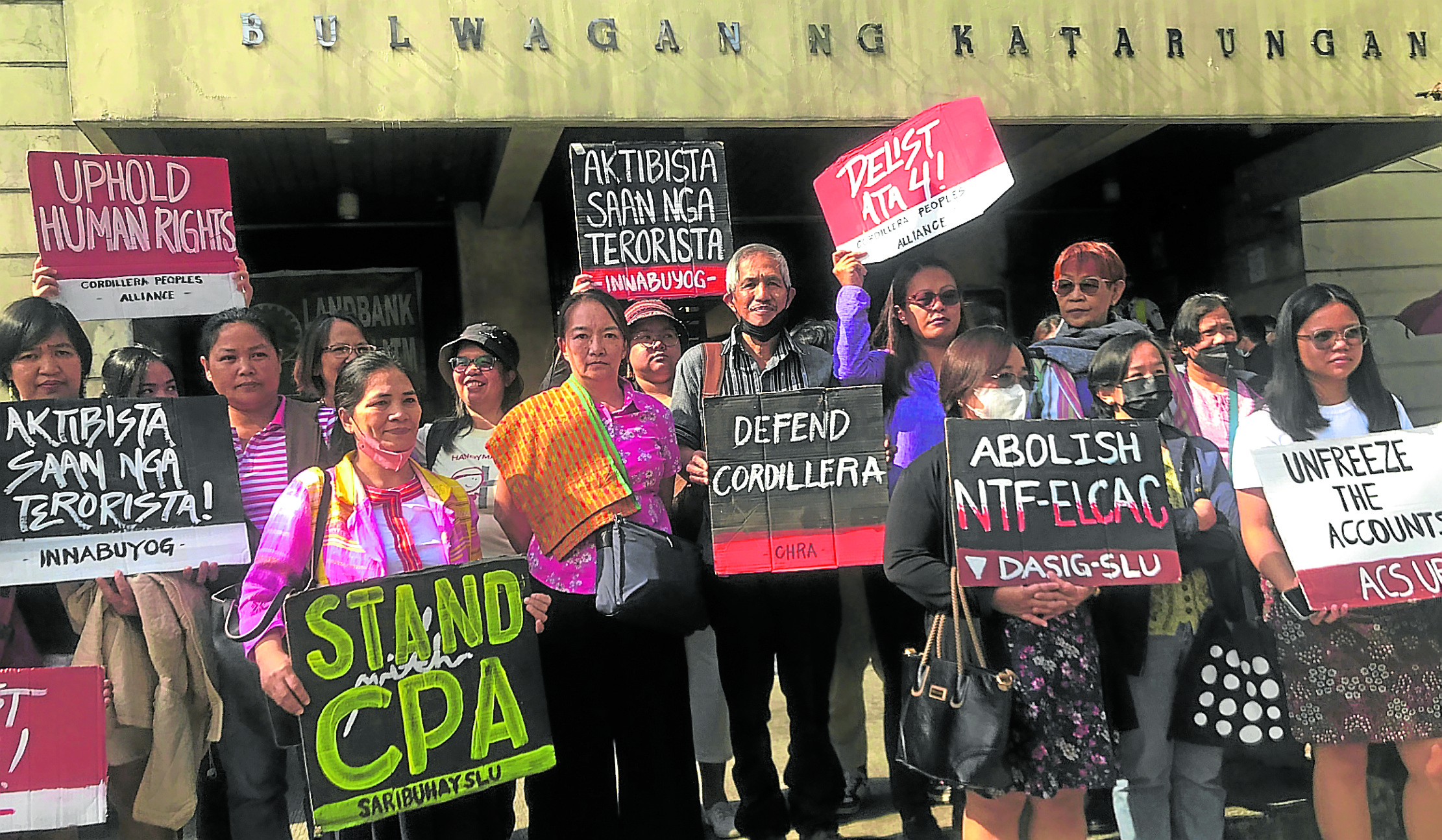Baguio court keeps jurisdiction over terror tag rap vs gov’t body

SUPPORT FROMALLIES Baguio-based human rights advocates throw their support behind fellow activists Windel Bolinget, Stephen Tauli, Sara Abellon-Alikes and Jennifer Awingan-Taggaoa as they stage a rally outside the Baguio Justice Hall on Friday after a regional trial court was granted jurisdiction by the Supreme Court over the activists’ petition against their designation last year as terrorists. —VINCENT CABREZA
BAGUIO CITY — The Supreme Court had allowed a regional trial court (RTC) in this city to proceed with the lawsuit seeking to overturn the terrorist designation of four indigenous Filipino activists from the Cordillera.
With the go signal from the high tribunal, Baguio RTC Judge Cecilia Corazon Dulay Archog of Branch 7 on Friday continued hearing the petition for a writ of preliminary injunction and petition for certiorari sought by Windel Bolinget, Stephen Tauli, Jennifer Awingan-Taggaoa and Sarah Abellon-Alikes who sought to be removed from the government terrorist roster.
They are members of the Baguio-based activist group Cordillera Peoples Alliance (CPA), who told the court they were declared terrorists “without due process” last year by the Anti-Terrorism Council (ATC).
A certiorari is a judicial review of actions taken by a court or an agency, in this case, the ATC.
READ: 4 Cordillera activists tagged as ‘terrorists’
Article continues after this advertisementBolinget, the CPA chair, informed the Inquirer last month that they needed a court injunction to stop the government from suppressing access to the activists’ bank accounts, which has victimized their families.
Article continues after this advertisementBut Archog suspended the hearings on Jan. 26 because of new high court rules governing the litigation of antiterrorism cases which took effect on Jan. 15. The high court’s Administrative Matters No. 22-02-19-SC provides new procedures for enforcing grievance mechanisms and handling complaints regarding the Anti-Terrorism Act of 2020 (Republic Act No. 11479).
Principles of jurisdiction
Because the new rules also tasked complainants with bringing their concerns to the Court of Appeals, Archog had asked the high tribunal if she should relinquish jurisdiction over the Baguio petitions.
The high court, on Feb. 6, said the lower court could continue hearing the case since the new procedures were released after the complaint against ATC was filed by the Cordillera activists.
In a Feb. 6 memorandum sent to Archog, the Office of the Court Administrator (OCA) said: “The Petition for Certiorari was filed on Nov. 23, 2023—predating the effectivity of AM No. 22-02-19-SC which took effect on Jan. 15, 2024. Thus, in accordance with the fundamental principles of jurisdiction, and since RA 11479 and AM No. 22-2-19-SC are silent on whether petitions … are to be transferred to the CA or to the designated antiterrorism courts, this office opines that your court shall continue hearing the instant case until the same is disposed of or terminated.”
“After all, jurisdiction was already attached to your court when the subject petition was filed on Nov. 23, 2023,” Supreme Court Administrator Raul Villanueva pointed out in the memorandum.
READ: Four Cordillera activists question legality of ‘terrorist’ tag in court
However, during the Friday hearing, the Office of the Solicitor General (OSG), which represents the ATC and the Anti-Money Laundering Council (AMLC), still urged Archog to drop the case despite the OCA’s decision.
Should Archog grant the petitions of Bolinget and the three other activists, it would only apply to Baguio and not the rest of the country, a government lawyer claimed in court.
Threats
The OSG’s supplemental motion filed on Wednesday argued that the Baguio court “only has jurisdiction to issue these writs on acts committed or in force within its territorial jurisdiction or region.” It said the assailed acts (ATC Resolution No. 41 which designated Bolinget, Tauli, Alikes, and Taggaoa as terrorists, and AMLC Resolution No. TF-67 series of 2023 which froze their assets) … were all made in Metro Manila.”
“More so, the effectivity of these acts is nationwide and not just within the Honorable Court’s territorial jurisdiction … [so] this leads to an absurd situation where the assailed acts are enjoined in only one part of the country while they remain effective elsewhere,” the OSG said.
A portion of the OSG’s comment cited the suspension of an RTC judge in Marawi City for “gross ignorance of the law and abuse of authority” after he issued in 2004 “a preliminary mandatory injunction against a litigant … outside of his court’s territorial jurisdiction.”
“[This] jurisdictional principle applies with equal force” in other circumstances, the OSG said, citing two more cases when judges were suspended for orders that affected agencies outside their judicial territories.
At one point in the hearing, Archog chastised an OSG lawyer, saying,
“I read your comment. Do not threaten the court.”
Outside the Baguio Justice Hall, CPA members caught some teenagers allegedly handing out leaflets bearing the message, “Deception will never win over the truth” in reference to CPA’s ongoing lawsuit.
The CPA reported the incident to the Baguio City Police Office, the city council, and Baguio Mayor Benjamin Magalong to establish that the lives of Bolinget, Tauli, Alikes, and Taggaoa remain in peril while under their terrorist designations.
CPA also filed a formal complaint with the police against an unidentified man who was allegedly videotaping Bolinget, Tauli, Alikes, and Taggaoa as they exited the courthouse with their counsel, Baguio Councilor Jose Molintas and Ephraim Cortez of the National Union of Peoples’ Lawyers.